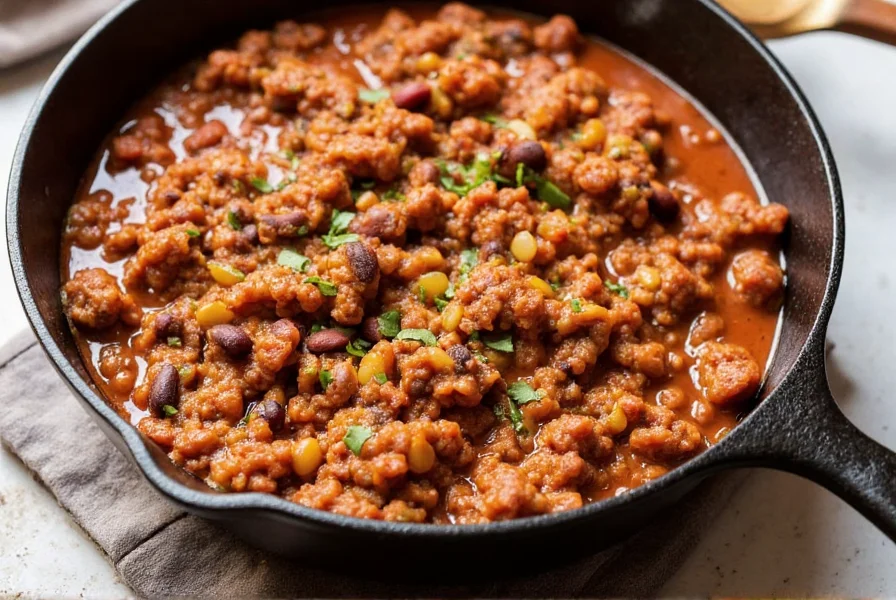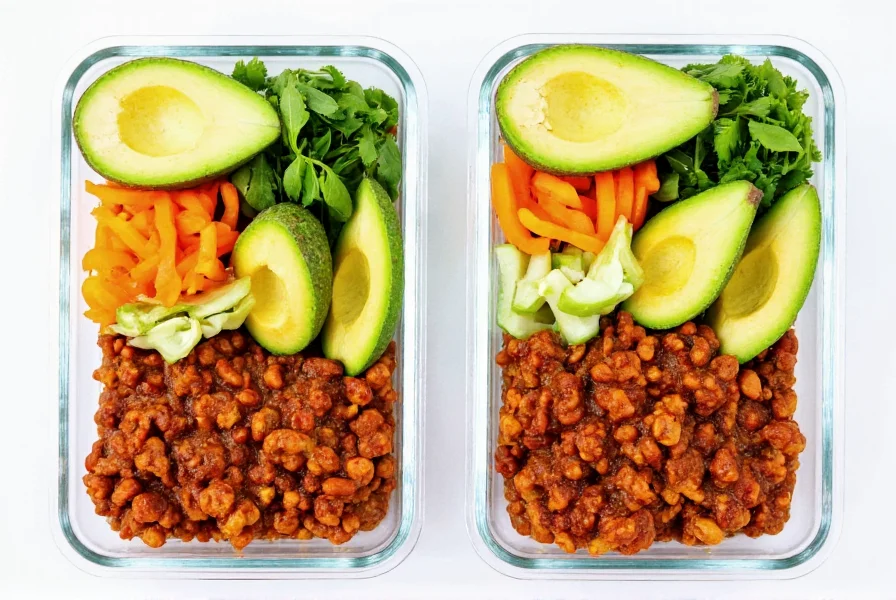Creating a truly exceptional protein chili requires understanding both culinary techniques and nutritional science. Unlike standard chili recipes that focus primarily on flavor, high-protein versions strategically incorporate multiple protein sources to maximize nutritional value while delivering the complex, hearty experience chili lovers expect.
Why Protein Chili Matters for Modern Diets
In today's health-conscious culinary landscape, protein chili has emerged as a nutritional powerhouse. The average American consumes only 10-15% of daily calories from protein, falling short of the recommended 15-25% for optimal health. A well-constructed protein chili can deliver nearly half your daily protein requirements in a single satisfying meal, making it particularly valuable for active individuals, those managing weight, and people following plant-forward eating patterns.
Top Protein Sources for Maximum Nutrition
The secret to exceptional protein chili lies in layering complementary protein sources. This approach creates a complete amino acid profile while adding distinctive textures and flavors:
| Protein Source | Protein per Serving | Unique Benefits |
|---|---|---|
| Lean ground turkey (93% lean) | 26g per 4oz | Rich in B vitamins, lower saturated fat |
| Black beans | 15g per cup | Fiber-rich, supports gut health |
| Lentils | 18g per cup | Iron-dense, cooks quickly |
| Textured vegetable protein (TVP) | 12g per 1/4 cup dry | Absorbs flavors, meat-like texture |
Professional chefs and nutritionists recommend combining at least three protein sources in your chili. This "protein layering" technique not only boosts nutritional value but creates more complex flavor profiles and satisfying textures that single-source protein chilis often lack.

Ultimate High-Protein Chili Recipe
This chef-developed recipe delivers 32 grams of complete protein per serving while maintaining authentic chili flavor. What sets it apart from standard recipes is the strategic combination of animal and plant proteins that work synergistically.
Ingredients
- 1 lb lean ground turkey (93% lean)
- 1 cup dried lentils (rinsed)
- 1.5 cups black beans (low-sodium, drained)
- 0.5 cup textured vegetable protein (rehydrated)
- 1 large yellow onion (diced)
- 4 garlic cloves (minced)
- 2 bell peppers (diced)
- 28 oz crushed tomatoes
- 4 oz tomato paste
- 2 cups low-sodium vegetable broth
Special Spice Blend
- 2 tbsp chili powder
- 1.5 tsp cumin
- 1 tsp smoked paprika
- 0.5 tsp cayenne (adjust to taste)
- 1 tsp cocoa powder (unsweetened)
- 0.5 tsp instant espresso powder
Instructions
- Brown turkey in large pot over medium-high heat, breaking into small pieces
- Add onions, garlic, and bell peppers; sauté until softened (5-7 minutes)
- Stir in spice blend and cook for 1 minute to bloom flavors
- Add crushed tomatoes, tomato paste, broth, lentils, and rehydrated TVP
- Bring to simmer, then reduce heat to low and cover
- Cook for 25 minutes, stirring occasionally
- Add black beans and cook uncovered for additional 10 minutes
- Adjust seasoning and serve with preferred toppings
Nutritional Analysis Per Serving (makes 6 servings)
This protein-packed chili delivers exceptional nutrition without artificial ingredients or supplements:
| Nutrient | Amount | Daily Value % |
|---|---|---|
| Calories | 315 | 16% |
| Protein | 32g | 64% |
| Fiber | 14g | 50% |
| Iron | 6.2mg | 34% |
| Vitamin C | 98mg | 109% |
Adapting Protein Chili for Specialized Diets
One of the remarkable features of protein chili is its adaptability to various dietary requirements without sacrificing protein content:
Vegetarian Protein Chili
Replace turkey with additional lentils and textured vegetable protein. Add 1 cup chopped mushrooms for umami depth. Include 0.5 cup hemp seeds during the last 5 minutes of cooking for complete protein enhancement.
Vegan High-Protein Version
Use all plant-based proteins: triple the lentils, add 1 cup cooked chickpeas, and incorporate 0.5 cup nutritional yeast for B-vitamin enrichment. The espresso powder in the spice blend enhances earthy flavors without coffee taste.
Meal Prep Protein Chili
This recipe excels for meal preparation. Store in airtight containers for up to 5 days in the refrigerator or freeze individual portions for up to 3 months. The flavors deepen when reheated, making it ideal for weekly meal planning. For best results when reheating frozen portions, add 1-2 tablespoons of broth to maintain optimal texture.

Avoiding Common Protein Chili Mistakes
Even experienced cooks make these critical errors when preparing high-protein chili:
- Overcooking plant proteins: Adding beans too early breaks them down, creating mushy texture. Always add canned beans during the last 10-15 minutes of cooking.
- Insufficient liquid: Protein-rich ingredients like lentils and TVP absorb more liquid. Maintain proper chili consistency by keeping extra broth on hand.
- Skipping the bloom step: Cooking spices in oil for 60-90 seconds before adding liquids dramatically enhances flavor complexity.
- Underseasoning: High-protein ingredients require more seasoning. Taste and adjust salt and spices after all components have melded.
Maximizing Protein Absorption in Chili
To ensure your body utilizes the maximum protein from your chili, consider these science-backed techniques:
- Add a squeeze of fresh lime juice just before serving - the vitamin C enhances iron absorption from plant proteins
- Include healthy fats like avocado or a drizzle of olive oil to improve absorption of fat-soluble vitamins
- Pair with a side of whole grain cornbread for complete amino acid profile
- Avoid excessive calcium consumption immediately after eating, as it can interfere with iron absorption
Conclusion: The Perfect Protein-Packed Meal
Protein chili represents the ideal intersection of nutrition and culinary satisfaction. By strategically combining multiple protein sources and respecting fundamental cooking techniques, you create a meal that supports muscle maintenance, promotes satiety, and delivers complex flavors. Unlike many high-protein foods that sacrifice taste for nutrition, properly crafted protein chili satisfies both your palate and your nutritional requirements. Whether you're an athlete, health-conscious eater, or simply looking for hearty, wholesome meals, this versatile dish deserves a regular place in your culinary repertoire.
How can I increase protein in chili without meat?
Combine multiple plant proteins like lentils, black beans, and textured vegetable protein (TVP). Add hemp seeds or nutritional yeast during the final cooking stage for complete protein enhancement. For maximum protein density, use a 2:1 ratio of legumes to grains in your recipe.
Does cooking method affect protein content in chili?
Yes, proper cooking technique preserves protein quality. Avoid boiling vigorously for extended periods, which can denature proteins. Simmer gently instead. Adding plant proteins like beans during the last 15 minutes of cooking prevents breakdown while maintaining optimal texture and nutritional value.
What's the ideal protein content for a balanced chili meal?
A nutritionally balanced protein chili should contain 25-35 grams of protein per serving. This amount provides sufficient amino acids for muscle maintenance without overwhelming your system. Pair with complex carbohydrates and healthy fats for complete meal nutrition that supports sustained energy and satiety.
Can protein chili help with weight management?
Absolutely. High-protein foods like protein chili increase satiety hormones, reduce hunger cravings, and maintain muscle mass during weight loss. The 32g protein and 14g fiber in our recipe creates exceptional fullness that lasts 4-6 hours, making it ideal for weight management when portion-controlled.
How long does homemade protein chili stay fresh?
Properly stored in airtight containers, protein chili maintains freshness for 4-5 days in the refrigerator. For longer storage, freeze individual portions for up to 3 months. The complex flavors often improve after 24 hours as ingredients continue to meld. Always reheat to 165°F (74°C) for food safety.
Frequently Asked Questions
How can I increase protein in chili without meat?
Combine multiple plant proteins like lentils, black beans, and textured vegetable protein (TVP). Add hemp seeds or nutritional yeast during the final cooking stage for complete protein enhancement. For maximum protein density, use a 2:1 ratio of legumes to grains in your recipe.
Does cooking method affect protein content in chili?
Yes, proper cooking technique preserves protein quality. Avoid boiling vigorously for extended periods, which can denature proteins. Simmer gently instead. Adding plant proteins like beans during the last 15 minutes of cooking prevents breakdown while maintaining optimal texture and nutritional value.
What's the ideal protein content for a balanced chili meal?
A nutritionally balanced protein chili should contain 25-35 grams of protein per serving. This amount provides sufficient amino acids for muscle maintenance without overwhelming your system. Pair with complex carbohydrates and healthy fats for complete meal nutrition that supports sustained energy and satiety.
Can protein chili help with weight management?
Absolutely. High-protein foods like protein chili increase satiety hormones, reduce hunger cravings, and maintain muscle mass during weight loss. The 32g protein and 14g fiber in our recipe creates exceptional fullness that lasts 4-6 hours, making it ideal for weight management when portion-controlled.
How long does homemade protein chili stay fresh?
Properly stored in airtight containers, protein chili maintains freshness for 4-5 days in the refrigerator. For longer storage, freeze individual portions for up to 3 months. The complex flavors often improve after 24 hours as ingredients continue to meld. Always reheat to 165°F (74°C) for food safety.











 浙公网安备
33010002000092号
浙公网安备
33010002000092号 浙B2-20120091-4
浙B2-20120091-4